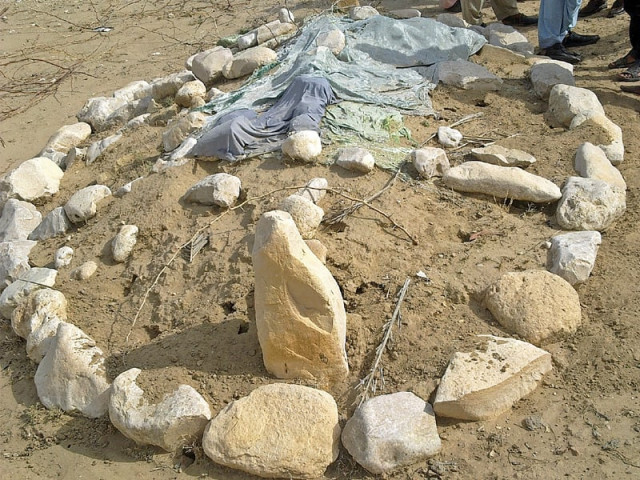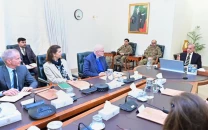Bitter-sweet homecoming: Return of the Native
Seven years after they were driven out, nearly 300 tribesmen return to Dera Bugti to find the town in ruins.

Grave of slain Jamhoori Watan Party leader Nawabzada Akbar Bugti in Dera Bugti. PHOTO: ZAHID GISHKORI/EXPRESS
Today, a grandson of Akbar Bugti led a convoy of nearly 300 fellow tribesmen to Dera Bugti to find the once bustling town in ruins, literally. The destruction is abundantly visible. A gurudwara pockmarked by bullets, a crumbling mandir and a damaged mosque, all speak about the post-2006 pluralistic society. The town had over 300 houses and 250 shops before the military operation. Today, the eerie silence of this ghost town is frightening.
“I have a mixed feeling of joy and grief,” said Gohram Bugti while standing in front of the once majestic Bugti House. The red-brick structure lies in a shambles, its doors, arches, living-rooms are dilapidated. In its heyday, the complex inspired awe and fear. It had its own private prison cells, while three underground tunnels led to nearby mountains, where the sardar and his loyalists had taken positions before the 2006 operation.
“We need at least Rs20 billion to rebuild this city,” Gohram told The Express Tribune correspondent who travelled with the Bugti tribesmen on their 18-hour epic journey from Islamabad to Dera Bugti.

Gohram, who now represents some 20,000 Bugti families, had migrated from Dera Bugti and Sui to other cities soon after the military operation started. The years since the operation have piled miseries on these tribesmen. And Gohram says they have had enough of bloodshed in the region. “I wish to hold talks with all Baloch leaders to restore peace and normalcy,” he said.
A handful of Baloch groups have been fighting an insurgency in the province. And some of Gohram’s own kinsmen have joined the insurgency since the 2006 military operation.
“Over 200,000 people had migrated from Dera Bugti and Sui to Rajanpur, Rahim Yar Khan, Multan, Karachi, Quetta, Kashmore, Hyderabad and other cities,” a Bugti tribesman, Mahfooz Bugti, told The Express Tribune. “Around 12,000 Hindus and 300 Sikhs were also among them.”
The private secretary to the slain chieftain claimed that around 700 people were killed in the operation. “Around two dozen Hindus were also among the fatalities,” added Nawabdeen Bugti.
The Hindu community still cherishes their hometown. “We want to resettle in Dera Bugti,” said Navand Kumar, a former elected representative of the Hindu community from the area.
The Kashmore-Dera Bugti Road is dotted with checkpoints of the Frontier Constabulary, Levies and police. No one is allowed to enter Sui and Dera Bugti without prior permission from authorities. “Sadly, our tribesmen were not allowed to visit their homes for seven years,” Mumtaz Bibi, the chief lady of Kalpar tribe told The Express Tribune. “We were not allowed even to bury our dead in the Bugti graveyard,” Nawabdeen added.
When the convoy set out on their epic journey, tribesmen oscillated between hope and fear. Even Gohram had doubts in his mind. “Frankly speaking, I wasn’t sure we’ll be able to make it to Dera Bugti,” he said. Earlier this year, a convoy of Bugti tribesmen was stopped by the security forces on border of Sui district.
As the convoy of 30 vehicles drove into Dera Bugti, Gohram was overwhelmed by an inexplicable joy. Dozens of euphoric tribesmen had turned up on both sides of the road to welcome their sardar. They were shouting slogans and clapping their hands. A beaming Gohram waved to them in return. Some tribesmen sacrificed goats on the road in gratitude.
Residents told The Express Tribune that the security forces voluntarily vacated the Bugti House and its adjacent buildings in response to a request from Prime Minister Nawaz Sharif to Army chief General Ashfaq Parvez Kayani.
The Express Tribune did not witness any military movement around Dera Bugti city as most of the bunkers were abandoned. However, the FC and local police were satisfied with the security arrangements.
Published in The Express Tribune, July 29th, 2013.



















COMMENTS
Comments are moderated and generally will be posted if they are on-topic and not abusive.
For more information, please see our Comments FAQ